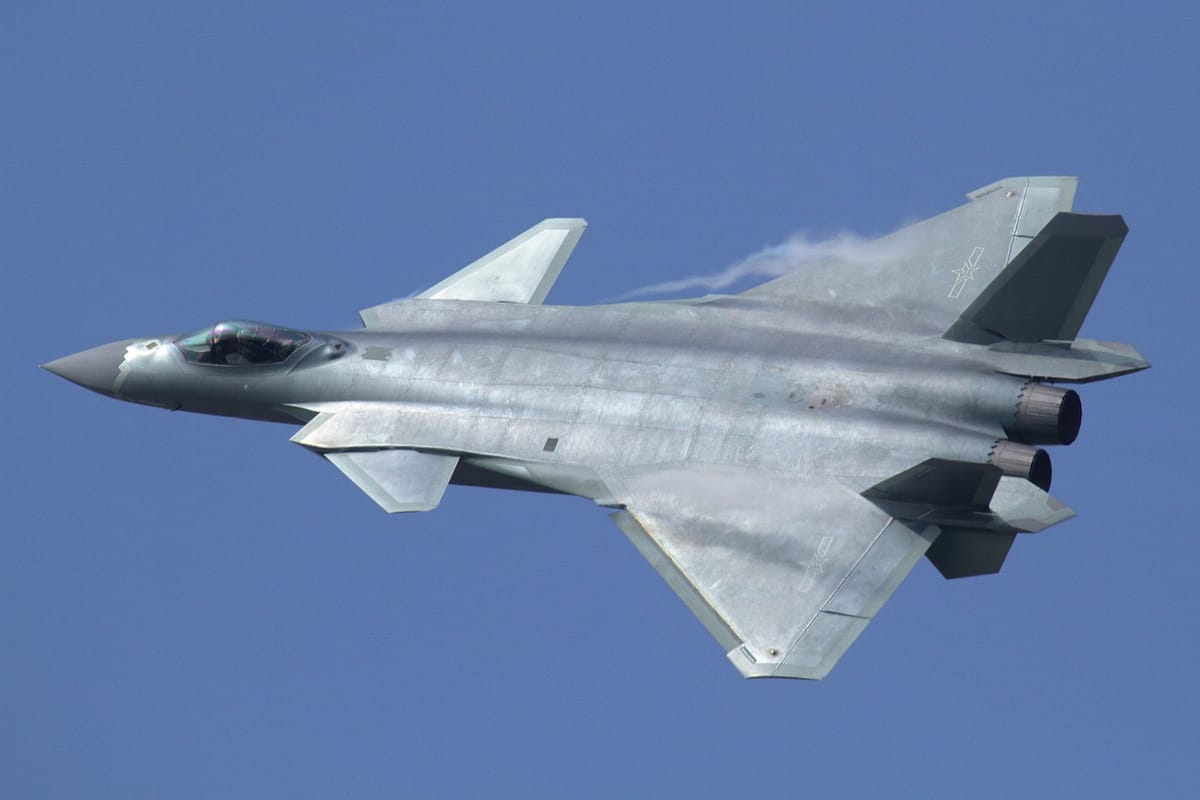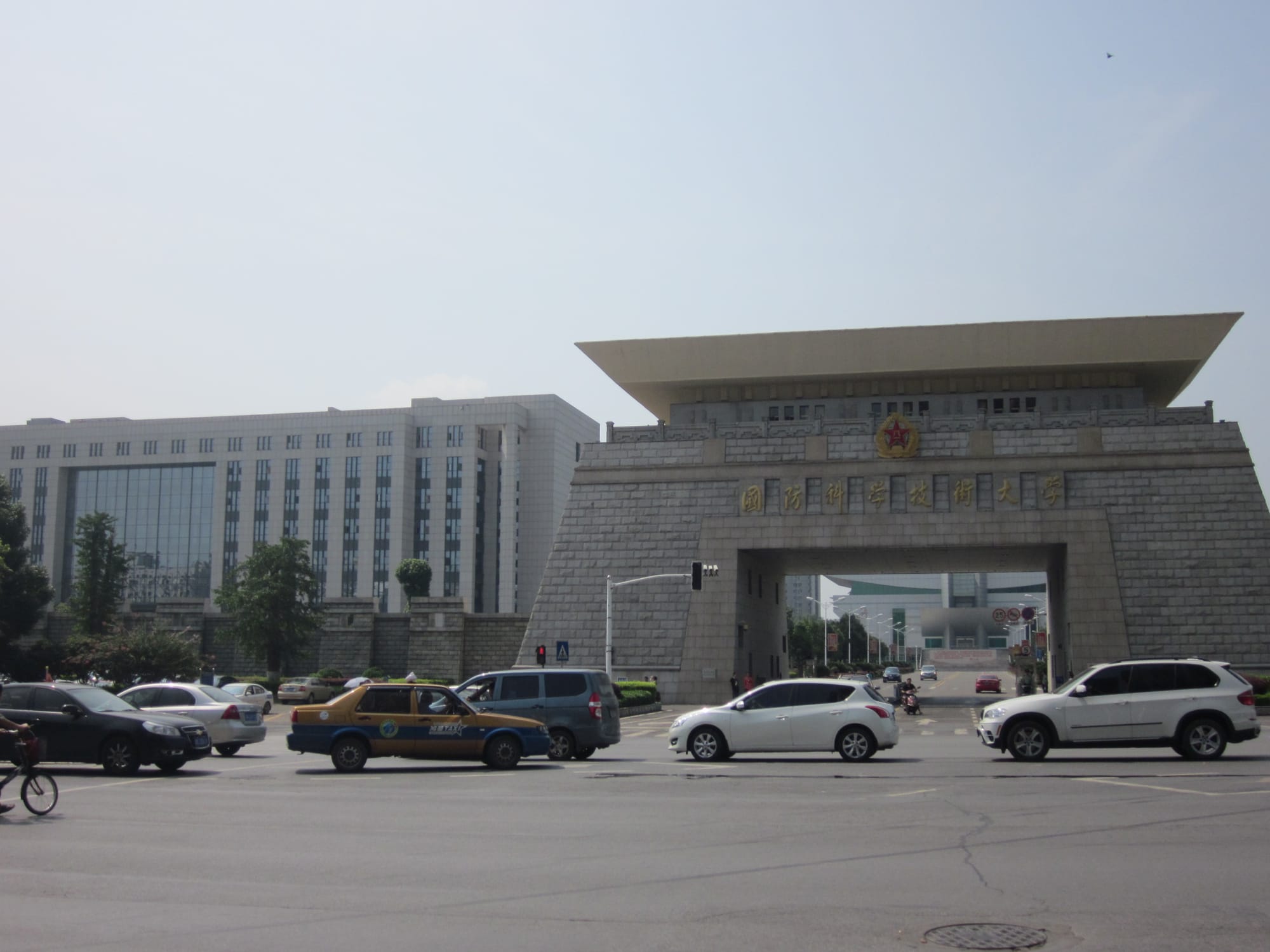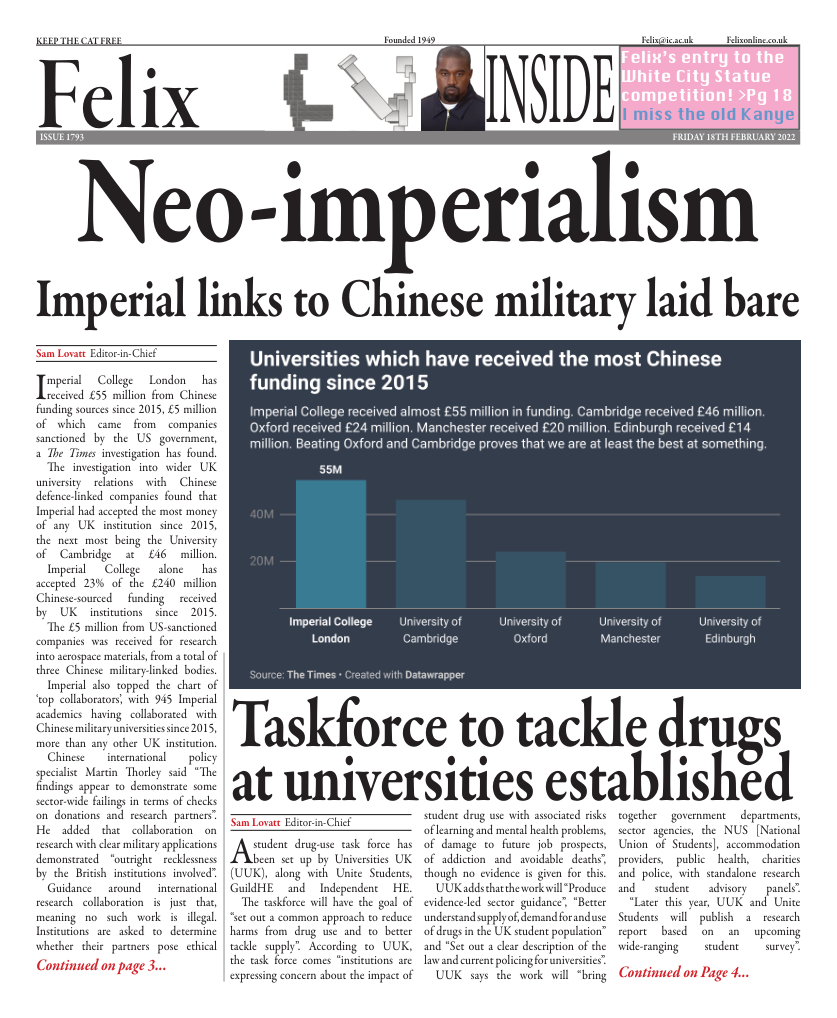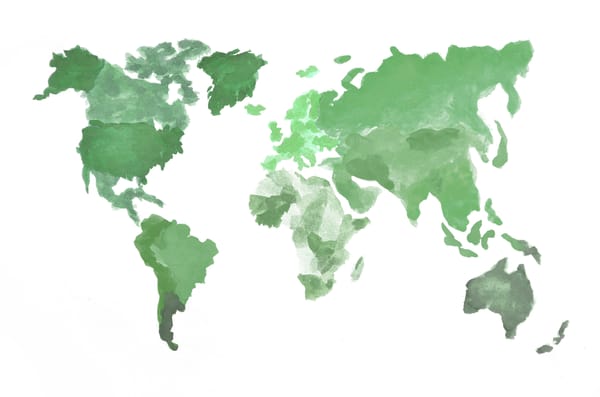Neo-Imperialism - Chinese military links laid bare
Imperial College London has received £55 million from Chinese funding sources since 2015, £5 million of which came from companies sanctioned by the US government.

Imperial College London has received £55 million from Chinese funding sources since 2015, £5 million of which came from companies sanctioned by the US government, a Times investigation has found.
The investigation into wider UK university relations with Chinese defence-linked companies found that Imperial had accepted the most money of any UK institution since 2015, the next most being the University of Cambridge at £46 million.
Imperial College alone has accepted 23% of the £240 million Chinese-sourced funding received by UK institutions since 2015.
The £5 million from US-sanctioned companies was received for research into aerospace materials, from a total of three Chinese military-linked bodies.
Imperial also topped the chart of ‘top collaborators’, with 945 Imperial academics having collaborated with Chinese military universities since 2015, more than any other UK institution.
Chinese international policy specialist Martin Thorley said “The findings appear to demonstrate some sector-wide failings in terms of checks on donations and research partners”. He added that collaboration on research with clear military applications demonstrated “outright recklessness by the British institutions involved”.
Guidance around international research collaboration is just that, guidance, meaning no such work is illegal. Institutions are asked to determine whether their partners pose ethical or security concerns, however, the wording is relatively vague.
The guidance is dispensed by the Centre for the Protection of National Infrastructure (CPNI), a branch of MI5. The CPNI urges institutions to consider the reputational risks of such collaborations.
Research is approved on the basis of its use in civilian applications. CPNI guidance highlights the dangers of “duel use” technology, which can be developed under the guise of a civilian technology but then redeployed for military use.
An Imperial spokesperson said “These projects are fundamental scientific research, carried out with partners and collaborators around the world and research findings are shared openly. All partnerships and collaborations at Imperial undergo thorough scrutiny and are regularly reviewed, working closely and regularly with the appropriate Government departments, with our commitments to UK national security given the utmost importance”.
Felix understands that Imperial College does not carry out classified research.
Some examples of sector-wide collaboration are fairly brazen. One University of Southampton professor has reportedly co-authored 18 papers with a Chinese scientist who designs warheads.
Chinese research institutions of concern usually fall within the group of Seven Sons universities, which have strong and indiscrete connections to the People’s Liberation Army (PLA).

Other funding sources of concern include Huawei, the Chinese telecoms giant, association with which Imperial has consistently received flack for in the media and from Imperial College Union. In January 2021, Imperial College Union’s council voted to condemn the association of Imperial with Huawei on the grounds of human rights abuses committed against the Uyghur minority by the Chinese government, and Huawei’s suspected involvement in this persecution through the development of AI technology to track Uyghurs.
Huawei remain the primary funding body for Imperial College’s Venture Catalyst challenge. The College also has £1.77 million invested in Tencent holdings, who Felix has found to have filed patents for facial recognition technology which touted improved accuracy on the identification of “minority groups, such as Uighurs... and black people”. The patent also described Uighurs as “special”.
Imperial received around 25% of the £20 million from companies sanctioned by the US.
On the donors of money received by Imperial from US-sanctioned Chinese companies, The Times said “This included the aerospace company AVIC, which supplies the Chinese air force with fighter jets, AECC, which provides military jet engines. It also included funding from the Beijing Institute for Aeronautical Materials, an AECC subsidiary from which it has received at least £2 million.”
An Imperial spokesperson said that all partnerships and collaborations undergo “thorough scrutiny”, were regularly reviewed, and that Imperial’s commitment to UK national security was of the “utmost importance”.
A 2019 Foreign Affairs Committee (FAC) report titled ‘A cautious embrace: defending democracy in the age of autocracies” commented on the influence of international money on UK research. The committee stated that some UK institutions are “reluctant to respond to allegations of influence due to their reliance on income from student recruitment and research grants”.
Imperial College is particularly poorly placed to suffer from a withdrawal of Chinese student recruitment, with Chinese students accounting for 23.4% of the total in 2019/20. Imperial are far from the university most reliant on Chinese tuition fees, with UCL apparently on top with 11,200 Chinese students, compared to Imperial’s roughly 4,660.
In 2019, the government published a white paper titled “International Education Strategy”, in which the case for a whole government approach to boosting the UK higher education sector on the global stage is made. The FAC noted that the government’s international education strategy involves the Department for Education and the Department for International Trade, but not the Foreign Office. It adds that China is explicitly mentioned over 20 times in the white paper, however none of these mentions are related to intellectual security.
According to The Times, “Researchers coming to study at UK universities on dual-use technology must be vetted if they are not from close allies. Research is subject to export controls, and the government can also intervene in intellectual property acquisitions under the National Security and Investment Act”. Concerns have been raised by the stark increase in the number of collaborations between UK and Chinese military scientists, which suggests to some that the government is not doing enough to protect against supporting the PLA.
The Times notes specific examples of collaboration between UK scientists and Chinese universities that have caused concern, one being consistent collaboration between a University of Birmingham optics specialist and academics at the National University of Defence Technology, described as China’s “primary defence research academy”. The optics specialist is not named but is said to have been part of the team who demonstrated the world’s first ‘invisibility cloak’. A 2011 paper published in Nature by Chen et al. makes such a claim and is likely co-authored by the academic in question. This paper is also co-authored by Imperial Professor Sir John Pendry, further highlighting Imperial’s collaboration, be it intentional or otherwise, with bodies linked to the Chinese military.
Involvement of Chinese companies in international development has been a contentious issue for many Western countries since the announcement of the ‘Military-civil fusion’ (MCF) initiative. The US state department describes this as an ‘aggressive’ strategy that involves ‘diverting the world’s cutting-edge technologies – including through theft – in order to achieve military dominance’, though no evidence of this is provided.
MCF constitutes the dissolution of the barrier between civilian and commercial research and the Chinese military. This means that research and data held by Chinese companies can be accessed by the CCP and the PLA whenever it is deemed necessary. As such, dealings with China-based companies are only slightly removed from dealings with the CCP itself.
The UK government dropped Huawei as a partner in developing the UK’s 5G network in 2020, with all Huawei equipment said to be removed from UK infrastructure by 2027.









